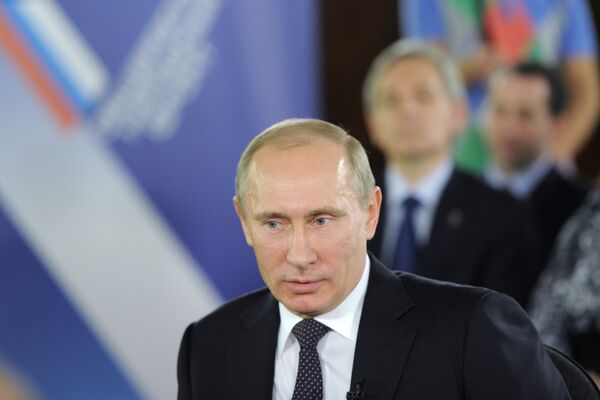Both Russian leaders have at last commented on the latest spate of protests in Russian cities, drawing a clear dividing line between what is acceptable (authorized rallies sponsored by Russian organizations) and unacceptable (illegal protests held by presumably West-funded NGOs).
As always, the difference was in the nuances that were influenced primarily by what audience the comments were intended for. President Dmitry Medvedev was speaking to journalists in the Czech Republic. Prime Minister Vladimir Putin was addressing the Russian People's Front Coordinating Council, which he is using as the main driver of his presidential campaign. (Russia's presidential elections are scheduled for March 2012.)
The fact that Putin was distancing himself from United Russia by turning to non-partisan supporters in the People's Front (which includes his electoral staff headed by popular film director Stanislav Govorukhin, and comprising a female teacher, a trade-union activist, an honorary steel-worker, a renowned pediatrician, among others) was meant to demonstrate that his support base was nationally-minded Russians whose consciousness was immune to Western influences.
He felt free to speak his mind regarding the West, delivering three powerful attacks against Russia's opponents.
First, he lashed out at Secretary of State Hillary Clinton's premature and negative reaction to Russia's elections, accusing her of fomenting protests in Russia.
Second, he said the protests were held by people "with an axe to grind," who were following a definite scenario that included breaches of the law.
Third, Putin accused the West of setting up and sponsoring some organizations posing as domestic Russian, who use foreign money and dance to a foreign nation's tune."
Dmitry Medvedev's pronouncements in Prague were not as direct as his colleague's. He said "protests are a sign of democracy," but his opening remarks were followed by the usual juridical refrain: "All rallies must be held in strict compliance with Russian law. If there are definite regulations for holding a rally, our citizens must be law-abiding."
But while talking with Central Election Commission head Vladimir Churov the day before, President Medvedev railed against foreign attempts to criticize the Russian party system in the same way Putin did ("Questions about the Russian political system are no business of theirs"). Given that, it is clear that the two leaders remain on the same page.
The West shouldn't have expected anything else. Political stability in Russia is the number one priority for Russian authorities and they are not willing to trade it even for the best of relations with the West. Therefore, any attempt by Western leaders to support political pluralism in Russia inevitably prompts a nervous reaction on the part of Moscow, even if the leaders are on the best of terms personally.
"Retaining political power in Russia is the primary objective for both Putin and Medvedev. Russian leadership is in fact ready to integrate with Western leadership, but only if it doesn't endanger Russian leadership's hold on power," says political scientist Stanislav Belkovsky.
But the question that has to be answered is whether Hillary Clinton's comments regarding "non-free and unfair" Russian elections carry that much weight? In essence, she has said nothing new: U.S. rankings have long described Russia as either a "partially free" or "non-free" country. But this has no bearing on America's real relationship with Moscow.
Rankings or not, the Jackson-Vanik amendment that dates back to the early 1970s is still in effect. Firmness is displayed only in one respect: U.S. leaders never recant or modify their rhetoric on human rights. In this case too, Clinton stuck to her point: "The United States and many others around the world have a strong commitment to democracy and human rights. It's part of who we are. We expressed concerns that we thought were well-founded about the conduct of the elections. And we are supportive of the rights and aspirations of the Russian people to be able to make progress and to realize a better future for themselves," were her words to journalists in Brussels, as quoted by RIA Novosti.
"I think Clinton's comments in this case are of a ritualistic nature. They shouldn't be given too much weight," said Boris Kagarlitsky of the Institute of Globalization and Social Movements.
Immanuel Wallerstein, U.S. philosopher and student of global processes, says that the West practices a certain type of "modern racism" with respect to Russia. The West's supposed advantage is described as "value-oriented," rather than racial or cultural. The implication is that Russia, with its dominant values, cannot join the civilized world.
But this is certain to change soon, he holds. On this point one would hope to agree with Mr. Wallerstein.
The views expressed in this article are the author's and may not necessarily represent those of RIA Novosti



